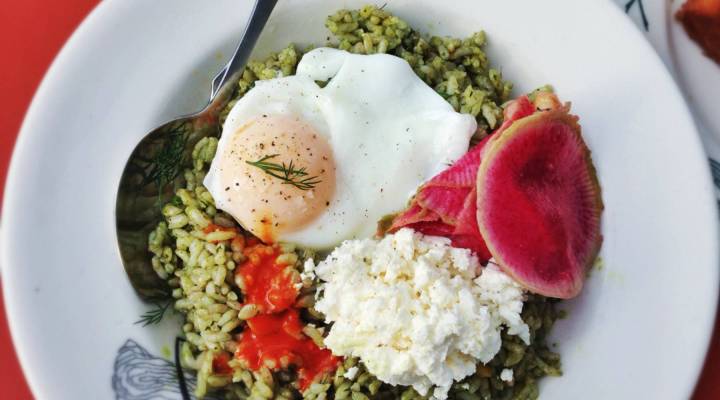
How the rise of food delivery is changing restaurants

At Jessica Koslow’s Los Angeles restaurant, Sqirl, there’s often a long line snaking from the cash register to the orange patio chairs outside.
Customers choose from a menu of bold breakfast and lunch offerings: ricotta toast, brown rice porridge, and buckwheat and cactus pancakes.
Since Koslow began serving customers five years ago, she’s noticed a trend.
“We’ve seen a huge increase in the number of orders to-go,” the chef and owner said.
With the rise of food delivery services like Postmates and DoorDash, restaurants are learning how to balance the new influx of orders.
At Sqirl, deliveries now make up almost a quarter of business, forcing Koslow to make changes in staffing.
“We started to get so many phone calls that none of our staff could answer the phone, so we really needed to make one particular person the owner of the phone,” she explained.
Koslow’s also had to rethink some foodier things, like how well her avocado toast or polenta travel in the backseat of a car or in the basket of a bike.
“Instead of using market lettuce, we use bok choy that’s hearty and can hold up a journey,” she said.
Often times, restaurants don’t have a say in who’s making that journey. A handful of delivery services – like GrubHub and Eat24 – partner with restaurants and get paid a commission.
Others – like Postmates and DoorDash – deliver food from restaurants without always entering contracts with them. If a restaurant can handle to-go orders, and a customer wants food delivered, the companies sends out couriers and charge a fee.
Some restaurant owners said that model can put a restaurant’s reputation at risk. If a customer gets the wrong order or it’s soggy, get ready for a nasty Yelp review.
“When we don’t get it right, we don’t run from it. We own up to it,” said Tony Xu, CEO of DoorDash, a service that delivers food in more than 250 cities.
Xu said his company tries to represent restaurant brands as best as possible.
“This is why we go to like 10 degrees of difficulty to figure out how to keep food warm, how to keep cold food cold, and how long it takes to make stuff,” he explained.
Charles Bililies owns two Greek restaurants named Souvla in San Francisco, and is trying to maintain some control over his brand. In the past, he’s asked certain delivery services to stop listing his restaurants on their apps and websites.
“They never sought after any sort of authorization to do any of this,” Bililies explained.
Often times, the services would mess up food descriptions or change his restaurant’s prices, he said.
“I didn’t want our guests to see an $11 pork sandwich when they dine in and it becomes a $14 pork sandwich when they’re looking at it on a delivery menu.”
So, Bililies partnered with Caviar, a delivery service that agreed to not raise his prices. He said delivery makes up about 15 percent of his original restaurant, and in an expensive city like San Francisco, that’s business he can’t afford to lose.
“It allows us to grow and thrive at time where we see restaurants quickly open and close, and open and close,” he said.
There’s a lot happening in the world. Through it all, Marketplace is here for you.
You rely on Marketplace to break down the world’s events and tell you how it affects you in a fact-based, approachable way. We rely on your financial support to keep making that possible.
Your donation today powers the independent journalism that you rely on. For just $5/month, you can help sustain Marketplace so we can keep reporting on the things that matter to you.












